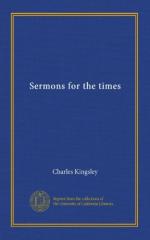Whether these things be true or false, it seemed to the ancient worthies who gave us our Catechism that children had no business with them. They had their own opinions on these matters, and spoke their opinions moderately and wisely, and the sum of their opinions we have in the Thirty-nine Articles, which are not meant for children, not even for grown persons, excepting scholars and clergymen. Of course every grown person is at liberty to study them; but no one in the Church of England is required to agree to them, and to swear that they are true, except scholars at our old Universities, and clergymen, who are bound to have studied such questions. But for the rest of Englishmen all the necessary articles of belief (so the old divines considered) were contained in the simple old Apostles’ Creed.
And why? Because, it seems to me, they were what Englishmen ought to be—what too many Englishmen are too apt to boast of being in these days, while they are not so, or anything like it—and that is, honest men and practical men. They had taught the children to say that they were members of Christ, children of God, and inheritors of the kingdom of heaven; and they had taught the children, when they said that, to mean what they said; for they had no notion that ’I am,’ meant ‘I may possibly be;’ or that ‘I was made,’ meant ’There is a chance of my being made some time or other.’ They would not have dared to teach children to say things which were most probably not true. So believing really what they taught, they believed also that the children were justified. For if a child is not justified in being a member of Christ, a child of God, and an inheritor of the kingdom of heaven, what is he justified in being? Is not that exactly the just, right, and proper state for him, and for every man?—the very state in which all men were meant originally to be, in which all men ought to have been? So they looked on these children as being in the just, right, and proper way, on which God looks with satisfaction and pleasure, and in which alone a man can do just, right, and proper things, by the Spirit of Christ, which He gives daily and hourly to those who belong to Him and trust in Him and in His Father.




